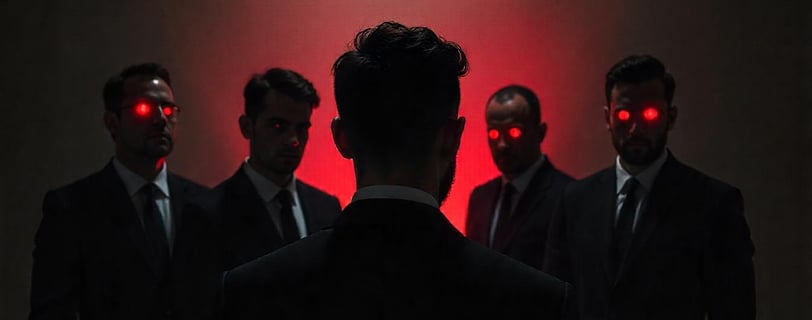Discover our newly tested, 100% natural products—ready for you
A day in 2009
The Career, the Love, and the Secret: The Dark Reality of Living with Halitosis ``To Protect the The young man's identity we will not mention his name Nor his girl friend's name in his Life story``
CHRONIC CONDITIONTRUE STORY
8 min read


He was a man of ambition—36 years old, Built himself from the ground up, charismatic, and laser-focused on his future. Two years ago, he joined a prestigious company, and in what seemed like record time, he climbed to the top. His colleagues marveled at his unique way of thinking, his unrelenting work ethic, and his uncanny ability to make tough decisions look effortless. For a while, everything seemed perfect. But perfection, as they say, often attracts envy.
The workplace was a jungle of egos and whispered ambitions. His colleagues, once impressed, grew envious of his meteoric rise. They whispered about him in hushed tones, picking apart his every move, his quirks, his weaknesses. The boss, initially proud of his star employee, started to feel overshadowed. The man’s brilliance was a double-edged sword, and the boss’s ego couldn’t bear to be outshone. Slowly but surely, the seeds of sabotage were sown.


At home, he found love—or so he thought. His girl friend was dazzled by his success and fell for his relentless drive, but over time, cracks began to show. She felt diminished by his achievements, and instead of lifting him higher, she sought to level the playing field. Little jabs, subtle manipulations, and moments of jealousy crept into their relationship. She craved attention and feared being left behind, so she began to exploit his growing insecurities That's when she started unconsciously setting him up for failure by criticizing him, asking for more than he could reasonably provide, and systematically questioning, challenging, and sometimes even overruling his decisions. Because he trusted her deeply, her actions—though not intentionally malicious—gradually undermined his confidence, leaving him feeling inadequate and unsure of himself."
As his responsibilities grew harder at work, so did his stress at home. Late nights at the office became the norm, fueled by cigarettes, caffeine, and an unhealthy drive to be perfect. He rarely slept, his meals were an afterthought, and the weight of his position bore down on him. His girl friend, instead of being a refuge, urged him to escape through weed and alcohol. Together, they indulged, pretending the world outside didn’t exist.


And then came the halitosis (Bad breath condition).
It crept in quietly, like an uninvited guest. The stress, poor diet, and mounting cortisol levels wreaked havoc on his gut and liver, the true culprits behind the bad breath. At first, no one said a word, not even his girl friend. But behind his back, the whispers grew louder. Colleagues who already envied him seized the opportunity. Passive-aggressive comments filled the air: “Someone’s been skipping hygiene,” or, “Do you smell something off?” Meetings became unbearable as he caught their glances and muffled laughs.
Even his girl friend, who once claimed to love him, used his weakness to gain power in their relationship. Instead of encouraging him to seek help, she let the problem fester, subtly making him feel inadequate. She began to distance herself, shaming him privately while laughing with her coworkers about his “fall from grace.” The man who once inspired her now embarrassed her.


The boss, sensing vulnerability, turned the screws tighter. Every interaction seemed designed to exploit his faltering confidence. Driven by emotions, the boss set impossible expectations, creating a suffocating environment where failure was inevitable. The once-dynamic man found himself stuck in an endless cycle of self-doubt and humiliation. Clients, who once admired his sharpness and charisma, began to avoid close interactions. Meetings, which had been arenas for showcasing his brilliance, turned into soul-crushing ordeals filled with sharp critiques and cold stares.
He sought solace in small measures. He tried everything—tongue scrapers, mouthwash, mints—desperately attempting to fix what he believed was the root of the problem. But the issue wasn’t in his mouth. It ran deeper, lurking in the cracks of his psyche, carved by relentless criticism and the toxic office environment. Yet, he was too overwhelmed, too consumed by the chaos to see it clearly.


One fateful day, everything unraveled. His girl friend, once his confidant and source of strength, had grown tired of the whispers and the ridicule. Whether driven by her own desire to save face or fear of how his downfall might impact her career, she made a choice. She left him. But it wasn’t just a quiet exit. She joined forces with colleagues who had been plotting his downfall for months, feeding into the toxic gossip mill that had engulfed the office.
That very day, in a climactic act of cruelty, the boss seized the moment to publicly humiliate him during a team meeting. In front of his peers, the boss laid bare his insecurities, spinning them as justifications to strip him of key responsibilities. It was a calculated move, aimed not just at reducing his influence but at shattering what little confidence remained.
The dual blows—the loss of his relationship and the public professional humiliation—struck like a storm, dismantling everything he had once held dear. His career, a source of pride and identity, crumbled under the weight of unrelenting pressure and betrayal. His relationship, which had been his refuge, dissolved into another chapter of his undoing. Once the epitome of strength and capability, he now stood amid the wreckage of his life, unsure of how to rebuild.


The man who had once been celebrated for his innovative ideas and unshakeable confidence now moved through the office like a ghost. His presence was met with hushed voices and pitiful glances. The same traits that had propelled him to greatness—ambition, creativity, and resilience—were now buried beneath layers of shame and self-doubt. He avoided eye contact, skipped social gatherings, and retreated further into himself.
Still, somewhere deep within, a faint ember of hope remained. Though battered, he began to question the narrative that had consumed him. He started reading about resilience, seeking guidance from mentors who had weathered their own storms. Slowly, piece by piece, he resolved to reclaim his life, determined not to let the actions of others define his future.
But the path forward would not be easy. He would have to confront the scars left by betrayal, rebuild his shattered confidence, and learn to trust again—in himself, and perhaps, eventually, in others. This was not the end of his story, but a painful and necessary chapter in his evolution.


He sat alone in his apartment that night, the silence deafening. The man who had it all was now a shadow of himself, undone not by his abilities but by the cruelty of those around him and the toll of neglecting his own health. It wasn’t just halitosis that destroyed him—it was the relentless pressure, the envy of others, and the betrayal by those he trusted most.
And so, his story serves as a chilling reminder: no success can shield you from the darker sides of human nature. And sometimes, the smallest, most overlooked problems can unravel even the strongest among us.
For six months, he vanished. No calls, no emails, no updates. The man who once dominated boardrooms and captivated hearts was nowhere to be found. Those who had torn him down whispered again, this time speculating about his mysterious disappearance. But while they gossiped, he was rebuilding.
In a small, quiet town far from the chaos, he began the hard work of healing. He sought out experts, learned about gut health,liver, cortisol and found remedies that not only fixed his physical health but also other ones that gave him clarity. He reflected on the betrayals, the toxic environments, and his own mistakes. Slowly, he pieced himself back together, stronger and wiser.
And then, one day, his phone rang. The Unexpected call that would change everything...


And then, one day, his phone rang. It was a manager from a leading competitor—a competitor of the company he had once called home. The call was not abrupt, nor overly rehearsed. It was deliberate, respectful, and brimming with opportunity.
The manager introduced himself with calm professionalism, expressing admiration for the man’s work and reputation. He acknowledged the whispers in the industry—how his former company’s brightest star had been extinguished too soon. But he didn’t dwell on the past; he focused on the future.
"We’ve followed your career closely," the manager explained. "Your work at Nokia didn’t just elevate their products; it defined their path. At Samsung, we’re looking for a visionary. Someone who can bring ideas to life and navigate the challenges of this rapidly evolving market. We’re prepared to offer you a position at our main branch in Tokyo, with all the resources you need to make an impact."
He listened carefully, appreciating the straightforwardness of the pitch. The manager’s tone conveyed not just ambition but respect—a stark contrast to the cutthroat environment he had left behind. Yet, he didn’t accept outright. He weighed his response carefully, conscious of how his answer would shape the next chapter of his career.
"I’ll need some time to consider," he replied. "This is a significant decision. I’ll get back to you in two days."
The manager agreed without hesitation, leaving the door open while maintaining a sense of urgency.


Two days later, the man called back. The conversation was concise but resolute. He accepted the offer, and arrangements were made for a meeting in Tokyo three days later.
When he landed in Tokyo, it wasn’t just another business trip. It was a new beginning. He carried with him the lessons of his past, the weight of his experiences, and a renewed sense of purpose. Within days of joining Samsung, he presented not only his insights into Nokia’s strategies but a bold vision for the future of mobile technology.
"Android," he proposed during a pivotal meeting. "This isn’t just an operating system. It’s the foundation for the next generation of mobile devices."
The room was silent, not with skepticism but with consideration. His ideas were met with open minds and collaborative spirits—a far cry from the resistance he had faced before. As he shook hands with his new boss, he felt the unmistakable spark of possibility. This time, he wasn’t just rebuilding his career; he was redefining it, on his terms.


after 6 months he heard about the story of the fall of his former company ,Nokia was slow to adopt touchscreens and underestimated the impact of iOS and Android. in the same year that their competitor rose by embracing Android technology and innovation and began releasing Galaxy smartphones, which quickly became strong competitors in both mid-range and premium markets.. without the young man`s direction It was the year his former boss, blinded by ego and the illusion of vision, set the company on a rocky path to decline.
The young man, after this pivotal event, couldn’t help but smile whenever he saw his former company in the media struggling to emerge from bankruptcy, knowing that their struggles were rooted in hubris and poor judgment.
A year later, some from his old circle tried to reach out, hoping to rekindle connections. But he had learned the hard way to : "Never give a ride to those who didn’t push the car when you ran out of gas."
Dive deeper with the Story Podcast Analysis
Get Confident
in every Breath


Prime Potion Space LLC 2024. All rights reserved.
Website Map
Compagny
Support
Socials
Instagram (soon)
Tiktok (soon)

